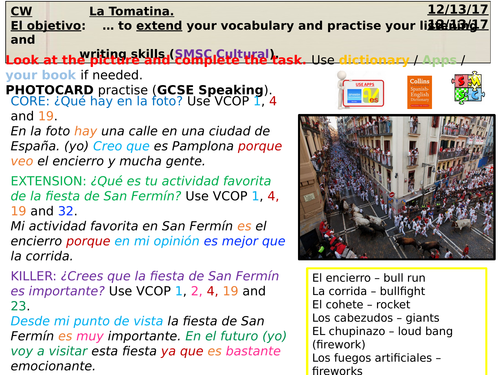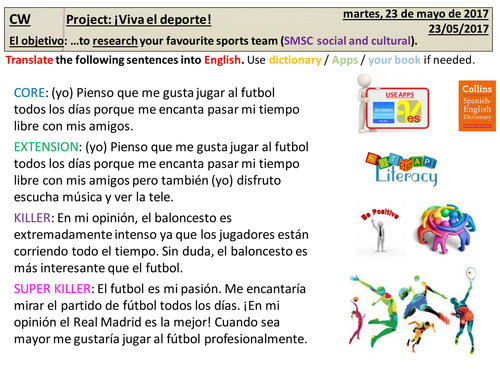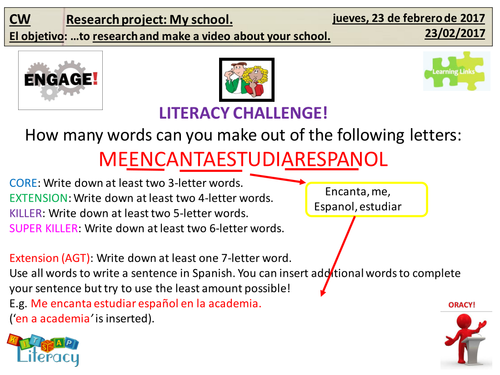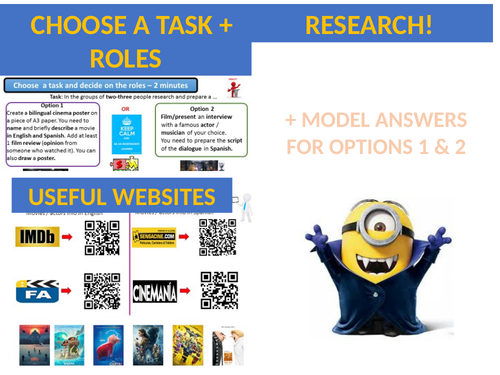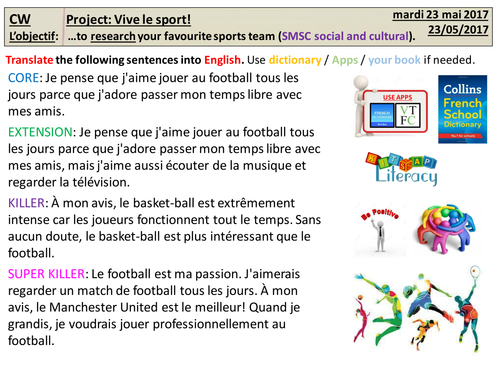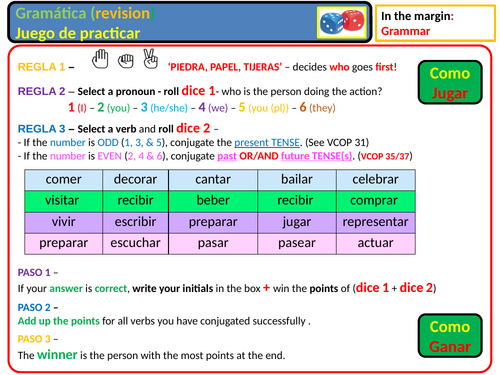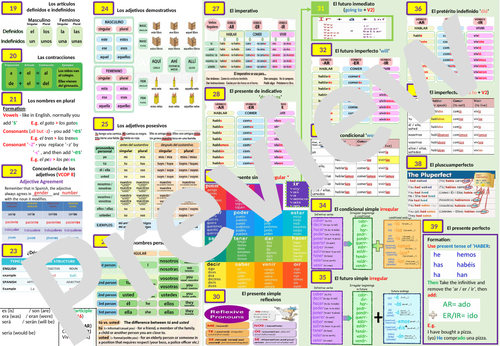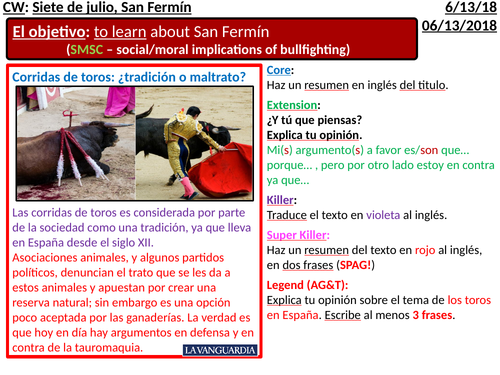
121Uploads
31k+Views
5k+Downloads
World languages
Bundle

Festivals and Celebrations bundle Cultural / SMSC
This bundle includes a collection of eight lessons created for few international celebrations such as Christmas and Easter as well as some traditional Spanish Festivals (e.g. Las Fallas, San Fermin, La Tomatina). I have tried to use some videos and games to make it more engaging whilst still providing students with some grammar / AQA GCSE exam practice. I also included the cultural starters I used as well as a template of my drill for teaching students how to answer AQA GCSE Reading parts A and B based on the text about Aste Nagusia, a Basque festival.
Bundle

Christmas bundle- Spanish/French - KS3/KS4 AQA
This a small bundle of two (possibly three) lessons for KS3/KS4 Spanish students. I also attach its analogue in French. Part of it is a research project than can take 1-2 lessons and another one is a lesson to describe your Christmas day in Spanish!

Spanish Festivals: La Tomatina - Spanish KS4 AQA Writing 3
This is the lesson that I have prepared for my y9/y10 in relation to the topic of Spanish culture (Festivals & Celebrations). The lesson starts with the starter about San Fermin Celebration (photo card style) (it was previous lesson title and I always try to link things together) and following review of lesson outcomes we move onto to trying to sing along with Enrique Iglesias (click on the 3d man for the youtube link or search for a YouTube video with lyrics). Students will then recap on SER conjugation in present tense and learn new / revise already known vocabulary on the topic of La Tomatina celebration using Quizlet and Quizlet live online tools. I have then included a video (see link) of Rosa from SpanishPod101 (see their channel in youtube) describing the celebration of La Tomatina. Even though the video is in Spanish and Rosa speaks really quickly, there are subtitles in English so that all students have a chance to listen to a native speaker and at the same time understand what the video is about (note: I personally find the Spanishpod101 videos amazing as they address quite a few cultural / grammar / pronunciation and other aspects so I would recommend letting your students know that a lot of resources are available for free. Consequently, students answer quiz questions about the video and move on to the grammar activity. They revise present tense and then analyse how to form 'Impersonal SE' structures. Then they do a quick test to check understanding and move on to a Writing Section 3 activity (translation from English into Spanish). They self-assess it and play Pictionary. Please note that there is also a handout to make the tasks easier and faster to access. Enjoy!

AQA GCSE (teaching from 2016) : Town and local area - Speaking - Photo card Model answer 1
This is the handout for my GCSE Spanish class to prepare for Speaking assessment. It includes brief success criteria and where to find it, what to include and a template for an answer. I have included both the PowerPoint slide and the handout.

Free time activities - Spanish - AQA GCSE new spec Part 3 HT - Conversation - Speaking frame
This is the speaking framework that I wrote for the early GCSE classes. The framework was originally designed for them to write an essay that they might use for the speaking test or keep it in file to revise prior to the exam. I have also used it as a writing model answer.
I have left references to the VCOP mat in case someone wants to put their numbers in, alternatively, just delete them as I left the names of the structures.

Research project (Motivational triggers) for KS3 Spanish - Viva el deporte!
This is a research project lesson (or two lessons really) that I created for my year 7 Spanish students. See similar post for early GCSE classes. The writing example can be easily adapted if more structures are to be added. The idea is to promote independent learning via research.Students have to research information about a sports team and create a poster. After that they have to produce a piece of writing to express their opinion on that team. Students decide on the task, the roles and start researching relevant information using their iPads (one of the students needs to summarise the information that others found). The whole process takes about 2 lessons and is perfect for the end of the topic as you can incorporate all of the structures / vocabulary learned during the term!

School Rules - Spanish - AQA new spec -Exam practice (Reading, Section C)
This is a 2b lesson on school rules for a GCSE Spanish class that I happened to have an observation with (unexpectedly!). The lesson includes a literacy starter (students have to find and amend the mistake in the sentence), a mini-plenary on grammar in relation to the starter, a tongue twister slide to practise 'i' sound, a mini-test on present tense verbs conjugation ( I often give these ones), a mini-test on articles, a pronunciation slide and a quizlet on the words that would be used in the reading task, and a reading task itself. I am trying to teach them how to approach these tasks in the most effective way so they underline the words they know and find out the ones they do not. I wrote the text myself on the basis of the one from the specimen materials for it to have a similar structure to the one they will see in the exam. Finally they self-assess their work (and learn new words!). This lesson includes the explanation on how to use 'Spanish Dict Box' application to finds out the meaning of unknown words.

Research project for KS3/KS4 Spanish - My school
This is a research project lesson (or two lessons really) that I created for my year 9 Spanish students. It can also be used for older students as the model answer has quite a list of grammar / some more can be added. The idea is to promote independent learning via research. There are two choices: a documentary about your school or an interview with between a student from your school and a school in Spain. Students decide on the task, the roles and start researching relevant information using their iPads (one of the students needs to summarise the information that others found). They then have to prepare a script in Spanish and to make a video using iMovie or any other video application. If there is little time I would suggest them to present it and I would film it. The whole process takes about 2 lessons and is perfect for the end of the topic as you can incorporate all of the structures / vocabulary learned during the term!

Free time activities - Spanish - AQA GCSE- Project (Motivational triggers) - 1-2 lessons
This is a research project lesson (or two lessons really) that I created for my year 9 Spanish students. It can also be used for older students as the model answer has a list of grammar / some more can be added. The idea is to promote independent learning via research. There are two choices: a bilingual movie poster (I wanted them to practise translating authentic information) about a movie of their choice or an interview with a famous actor/musician. Students decide on the task, the roles and start researching relevant information using their iPads (one of the students needs to summarise the information that others found). Those who chose the second option have to prepare a script in Spanish and if there is enough time, to make a video using iMovie or any other video application. If there is little time I would suggest them to present it and I would film it. The whole process takes about 2 lessons and is perfect for the end of the topic as you can incorporate all of the structures / vocabulary learned during the term!

My studies - Spanish - AQA GCSE new spec Part 3 HT - Conversation - Speaking frame + Model answer
This is the speaking framework and the model answer that I wrote for the early GCSE classes. The model answer and the framework were originally designed for them to write an essay that they might use for the speaking test or keep it in file to revise prior to the exam. I have also used it as a writing model answer.
There are three documents in there because I was trying to check what works better and in the end decided that the framework is quite sufficient for them to realise what are they expected to write / say.
I have left references to the VCOP mat in case someone wants to put their numbers in, alternatively, just delete them as I left the names of the structures.

Research project (Motivational triggers) for KS3 French - Vive le sport!
This is a research project lesson (or two lessons really) that I created for my year 7 French students. The writing example can be easily adapted if more structures are to be added. The idea is to promote independent learning via research. Students have to research information about a sports team and create a poster. After that they have to produce a piece of writing to express their opinion on that team. Students decide on the task, the roles and start researching relevant information using their iPads (one of the students needs to summarise the information that others found). The whole process takes about 2 lessons and is perfect for the end of the topic as you can incorporate all of the structures / vocabulary learned during the term!

AQA GCSE Spanish - Writing (Foundation) answer strategy - Question 3
This is a template that I prepared for my higher year 8 Spanish students and early KS4 in relation to answering a Writing Foundation Question 3. Please note that this is a template and can be reused for different topics. This one is related to the topic of free-time / holiday activities.
Students begin by discussing the strategies and looking at the success criteria and marking scheme together with the teacher. They also revise some basic grammar rules (can be amended each time you do the task). They also look at the model answers and discuss usual mistakes and how to avoid / amend them. Then they play few verb conjugation games to revise some useful verbs. I included the snakes and ladders game as well as the dice game (see templates in the end of the presentation). They review their answers to the dice game using grammar rules and correct their answers. Consequently they work in pairs to prepare a response to another (but similar!) Question 3. Finally they do it individually and self/peer -assess their work.
Please let me know if there are any problems / ideas!

Spanish Verb conjugation games (AQA GCSE/KS3)
This is a collection of verb conjugation games that I decided to share. I would use them for pretty much all age groups, both KS3 and KS4, GCSE both tiers. They can be easily amended to suit the grammar topics that you wish to reinforce / revise / introduce. The templates can also be easily reused for French.
See enclosed:
Snakes and ladders slide (you can amend the squares and it is short enough to serve as a 5-10 minutes activity;
The dice game to revise verbs conjugations (differentiated). I included a slide with rules of the game, a template to create your own and an origami instructions to make it more hands on.
Dice conjugation (differentiated) - I would mostly suggest it for KS4 students as it is easier to differentiate. Students have a board with verbs and they need to roll dices to ascertain the personal pronoun that they apply to the infinitive on the board. My students totally loved it!
Let me know how it goes!

AQA GCSE (KS4) / KS3 VCOP - Spanish Literacy Mat
This a VCOP / Literacy Mat that I have prepared for my KS3 and KS4 classes. I prepared it to reflect AQA examination criteria however I believe Spanish language does not change in-between different examination organisations so can be used for different ability students studying for different types of exams. It covers 39 different grammar structures including main verb tenses and popular structures that I recommend my students use for their writing, speaking and reading practice (and learn to identify when listening). It is partially differentiated (see groups highlighted in 3 colours - blue for Core, green for Extension, red for Killer). Parts of the mat with green background represent the most popular verb tenses and verbal structures.
I have included the most useful (in my point of view) opinions, adverbs, exclamations, connectives, linking expressions, quantifiers, time expressions, question words, V1 + V2 structures, subjunctive and conditional phrases, gerunds and few more expressions that worth few shiny points if used during the exam. I have considered it would be useful to include the endings and explanation on how to follow adjectival agreement rules, use correct articles and pronouns. In relation to verb tenses, providing there is not as much space as it seems to be, I have included the verb tables for present simple (regular and irregular + self-reflexive), imperative, immediate (near) future, ‘will’ future, regular and irregular conditional, past simple, imperfect and past perfect (for those who are truly passionate about grammar.
If you wish to add something just amend / move few boxes and you will be done. If printing, I would recommend to do so on A3 to ensure that all of the instructions are clearly visible.
Note: to remove ‘Preview’ just select it and delete - it is just one text box. Let me know how it goes and what you think!

AQA GCSE Spanish - SMSC/Cultural- Las Hogueras de San Juan Listening A + writing FQ1/ HQ4
This is the lesson that I have prepared for my higher y8/ and y9/y10 in relation to the topic of Spanish culture (Festivals & Celebrations).
The starter is based on the review of the cartoon called ‘The Book of Life’ (El Libro de la Vida). Students read the review and complete various tasks according to their ability. Then they check their answers, review the lesson objectives and have fun resiting a tongue twister (I personally believe phonics is the way forward for the students of all ages). Students will then learn new / revise already known vocabulary on the topic of Las Hogueras de San Juan festival using Quizlet and Quizlet live tools. I have then included a video (see link) of Rosa from SpanishPod101 (see their channel in youtube) describing the festival.
Even though the video is in Spanish and Rosa speaks really quickly, there are subtitles in English so that all students have a chance to listen to a native speaker and at the same time understand what the video is about (note: I personally find the Spanishpod101 videos amazing as they address quite a few cultural / grammar / pronunciation and other aspects so I would recommend letting your students know that a lot of resources are available for free. Consequently, students answer quiz questions about the video. I presented it as a Listening task.
Then they move on to Writing Foundation Questions 2 and 4 // Higher Tier Question 1. Students begin by translating the short text into English and coaching each other if stuck at the same time assessing each others work. Then they revise some grammar by playing tarsia game (see template in the end of the presentation).
Consequently they get on with reading the question and what is required from them and discussing the what they could include in their answer (both content and grammar structures). Then they make a break and play a dice game (can be prepared prior to the lesson or during the same - see template in the end of the presentation) and a learning grid to revise verb tenses. They then get back to the task and work in pairs to plan their answers. Finally they complete the task individually, discuss the success criteria and the marking scheme with the teacher and peer / self assess their work.
And, as a reward they play Hangman! (I have posted this slide for free within my resources - search for ‘El ahorcado’).
Please let me know if there are any problems / ideas!

GCSE Spanish- 6 Starters -Cultural/SMSC (differentiated -5 levels)-Speaking, Reading, Writing skills
This a set of Starters with answers that could be used either for the lessons from the topic of festivals and celebrations or as a stand out SMSC - Cultural starter. I included answers so that children can check their answers. These are mostly for higher y8 or for KS4 lessons, differentiated (CORE, EXTENSION, KILLER, SUPERKILLER, LEGEND). All of the instructions are in Spanish.
They can also serve as a template to create your own tasks - just change the text and (slightly) the questions.
First Starter is on the topic of San Fermin and includes an authentic text from the ‘La Vanguardia’, an on line newspaper. The examination focus of this starter is Reading. Second Starter features similar tasks but a different text, also authentic.
The third one is on the topic of La Tomatina and is essentially a Role-play task with success criteria. It therefore focuses on Speaking.
The fourth one is a Photo card Starter on the topic of Aste Nagusia (or festivals in general) with help and instructions and therefore can be used as a Speaking / Writing activity. Fourth one follows the same idea but is designed for the topic of holidays.
The fifth is a grammar starter for any holidays topic and its focus is the Past Simple (preterite) and the Future SImple (‘will’). We use Viva books so I included help boxes as a reminder for those who do not clearly remember the endings.
The sixth starter focuses on Reading (parts B and C). Students translate and analyse the adjectives in the Wordle.
Let me know what you think!
Bundle

AQA GCSE Spanish - Reading (A, B, C), Writing (1-4 aka Speaking Conversation) and Speaking (Photo card and Role Play) (Foundation/Higher) answer strategies
These are the templates that I prepared for my higher year 8 Spanish students and early KS4 in relation to answering Reading (A, B, C), Writing (1-4 aka Speaking Conversation) and Speaking (Photo card and Role Play).
They include different sets of reading activities and games to answer the questions of the AQA GCSE exam. The tasks are set for my Foundation tier but might as well work for Higher if mildly redacted.
Please let me know how it goes!
Bundle

Spanish Grammar / Vocabulary Games KS3/KS4/GCSE - Foundation and Higher
This is a collection of grammar games that I decided to share. I would use them for pretty much all age groups, both KS3 and KS4, GCSE both tiers. They can be easily amended to suit the grammar topics that you wish to reinforce / revise / introduce. The templates can also be easily reused for French.
See enclosed:
Snakes and ladders slide (you can amend the squares and it is short enough to serve as a 5-10 minutes activity;
Tarsia slide and template - an activity to use to revise topic / key vocabulary. Students can either create their own or just cut the one you prepare for them. They need to then match the words / expressions in English with their Spanish equivalents.
The dice game to revise verbs conjugations (differentiated). I included a slide with rules of the game, a template to create your own and an origami instructions to make it more hands on.
Photo card scrabble (related to AQA GCSE speaking / writing tasks). I originally thought of this as a game prior to completing an exam task for KS4 students. The pack includes a slide and a scrabble board if you wish to organise an extended activity. Students need to come up with words related to the image, the words should contain 3 or more letters and they should be in Spanish!
Dice conjugation (differentiated) - I would mostly suggest it for KS4 students as it is easier to differentiate. Students have a board with verbs and they need to roll dices to ascertain the personal pronoun that they apply to the infinitive on the board. My students totally loved it!
One dice, one pen (un dado, un boli) - (differentiated, AQA Reading Section C / Writing Part 3 Higher / Foundation) - Students roll dice in turns to translate the sentence correctly! If the partner throws 3 he takes over a pen. The winner is the one who collected the most points. I used it with KS4 to facilitate the exam translation tasks. I also included a set of slides that I used to emphasize certain grammar points.
Let me know how it goes!

GCSE Spanish - SMSC / Cultural -El Carnaval - Photo Card (AQA)
This is the lesson that I have prepared for my higher y8/ and y9/y10 in relation to the topic of Spanish culture (Festivals & Celebrations) and is mostly related to El Carnaval. I used it as a general topic to look at the photo card task (speaking / foundation writing). The starter focus is reading - students complete differentiated tasks in relation to an authentic extract from on line newspaper.
Students will then learn new / revise already known vocabulary on the topic of carnivals/ festivals using Quizlet and Quizlet live tools. Then they recap on the success criteria for Speaking Q2 / Writing Q1 - Photo card- and complete a photo card task based on a photo of a carnival celebration together. They jot their thoughts first, play a catchphrase game and then prepare their responses in pairs on the second photo card. Finally they complete a third photo card task individually and self / peer assess the same. In-between the photo cards I inserted some verb games to make the lesson more fun for the students and not to let them get bored.
Let me know what you think!

KS3 KS4 Spanish - SKILLS - How to use a dictionary effectively / Aste Nagusia
This is the resource that I have prepared for both GCSE and KS3 classes. It can be used as a template as the only thing you would change is the text and the words. I believe the full set of slides needs to be used several times until a group of students remember the sequence of actions. The only thing left is to continue revisiting to gain confidence in using the dictionary!
The text that I chose to introduce this task is based upon short cultural texts on the topics of a Basque festival, Aste Nagusia, and Las Hogueras de San Juan. Students look through the first text and analyse the explanation of different things one can find next to the Spanish word in a dictionary. Then they compete (a game!=team challenge) to translate the words.
Then they work in teams to figure out how to use the bi-lingual dictionary effectively - they analyse simple words used in classroom language and try to find their meaning in Spanish at the same time not forgetting to pay attention to gender of the nouns and adjectival agreement (extension - they think of more examples of words they could use). For KS4 students you might add another level of difficulty - include verbs in English in different tenses and let them decide how to correctly translate these verbs in Spanish.
Finally they have a look at the second text and try translating it themselves into English (or given words / very simple text if KS3)
The most important thing in my point of view is to remember that translating is an art not a precise science!
NOTE: I used a dictionary cut outs from the internet which is most likely an extract from Collins Eng-Sp and Sp-Eng dictionary.



